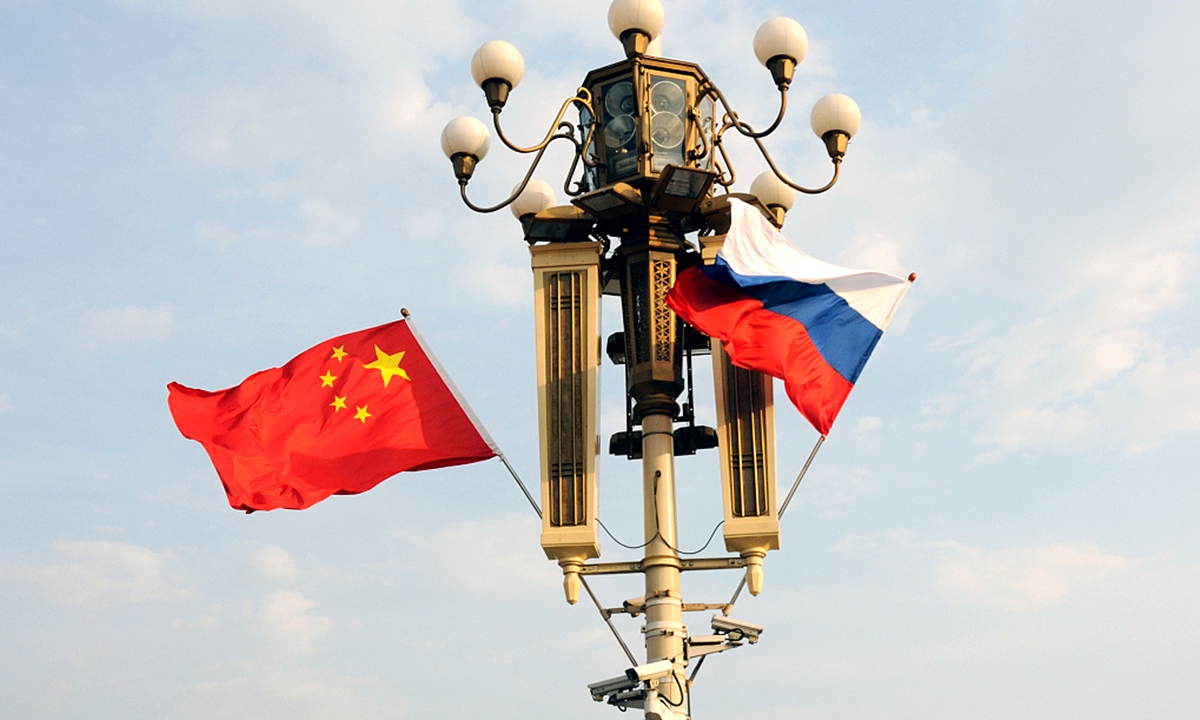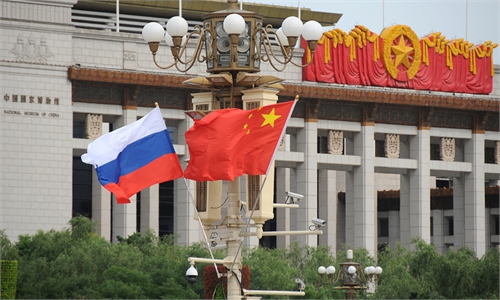China-Russia govt heads stress strategic consensus to jointly deal with external pressure at regular meeting

China Russia. Photo: VCG
Chinese and Russian governments agreed to further deepen mutual trust and cooperation, as Chinese Premier Li Keqiang held the 26th regular meeting between Chinese and Russian heads of governments with Russian Prime Minister Mikhail Mishustin via video conference on Tuesday.
Speaking at the event, Li noted that China and Russia, both major economies and emerging markets, share strategic consensus on upholding multilateralism and safeguarding the international system with the United Nations at its core, and the international order based on international law.
Mishustin said the Russia-China comprehensive strategic partnership of coordination for a new era is at an all-time high and continues to develop rapidly. The two countries should jointly cope with external challenges on the basis of mutual respect, mutual trust, equality and mutual benefit, and that Russia supports China in hosting the Beijing Olympic Winter Games. They jointly announced a Joint Communiqué and cooperation documents.
Chinese observers said as the two sides celebrate the 20th anniversary of the signing of the China-Russia Treaty of Good-Neighborliness and Friendly Cooperation this year, China and Russia have taken bilateral ties to new heights, with fruitful results in multiple spheres including defense, people-to-people exchanges, and economy and trade, as well as comprehensive strategic coordination and all-round practical cooperation.
China and Russia have been working closely together to overcome the impact of the pandemic, conduct cooperation in innovative ways, and advance the steady and orderly development in overall practical cooperation in various sectors, demonstrating enormous resilience and the strong internal drive of their cooperation.
Vice Premier Hu Chunhua, who co-chaired the 25th session of the committee for regular meetings between Chinese and Russian heads of government on November 25 via video link, said that Chinese President Xi Jinping and Russian President Vladimir Putin held a video meeting in June and spoke again on the phone in August, when they reached a new consensus on major issues such as strengthening China-Russia comprehensive strategic cooperation and all-round practical cooperation.
Hu said thanks to the joint efforts, cooperation on trade, investment, agriculture and other fields has achieved fruitful results, which reflects the comprehensive and high-level China-Russia comprehensive strategic partnership of coordination for a new era.
During the first 10 months of this year, bilateral trade reached $115.6 billion, over 30 percent higher than the same period last year. Before the year ends, it is expected to reach a new high, Chinese Foreign Ministry spokesperson Wang Wenbin said at a routine press conference on Monday.
On military cooperation, the two countries recently signed a roadmap for closer ties, which, according to military experts, indicates that Russia and China have common interests and views on strategic stability and regional security, especially in the Pacific region.
Such enhancement of cooperation in the defense sector is also viewed as a reaction to the West's pressure on Russia and to the alarming signals that China received from the US and its allies, experts said.
Wu Qian, spokesperson for the Ministry of National Defense, said at a press conference on Thursday that the Chinese military expects an even better relationship with its Russian counterpart, and is willing to play a bigger role with it in safeguarding world peace and stability.
The signing of the road map for closer military cooperation reflects the high-level mutual military trust between China and Russia, Song Zhongping, a military expert and TV commentator, told the Global Times.
Chinese State Councilor and Defense Minister Wei Fenghe held talks via video link with Russian Defense Minister Sergei Shoigu on November 23, and a Chinese Ministry of National Defense statement on the event said that this year, the Chinese and Russian militaries deepened cooperation in various fields, with new breakthroughs in joint exercises and training in particular.
China and Russia have conducted three joint strategic air cruises and their first joint maritime cruise this year. Song said the frequency and intensity of such cruises will continuously increase and serve as the main military cooperation between China and Russia.
Cooperation on major projects has steadily advanced and virtual and in-person people-to-people and cultural exchanges remain popular. The success of the China-Russia Year of Scientific and Technological Innovation injected fresh impetus into deepening our all-round cooperation, Wang noted on Tuesday.
Energy cooperation, as an important part of bilateral relations, has also seen new progress.
Major cooperation between the two countries includes units 7 and 8 of the Tianwan nuclear power plant in Lianyungang, East China's Jiangsu Province, and units 3 and 4 of the Xudapu Nuclear Plant in Huludao, Northeast China's Liaoning Province, the largest China-Russia nuclear energy cooperation project to date. As of Monday morning, the first batch of Russian-supplied large-scale equipment cleared Customs and is on their way to the construction site in Liaoning.
Trade between China and Russia in the energy sector from January to September reached $34.9 billion, which accounts for 34.3 percent of total trade between the two sides, data from the National Energy Administration showed.
This year, trade in both natural gas and coal increased more than 60 percent year-on-year so far, while the electricity trade rose 1.4 percent to 2.38 billion kilowatt-hours, it said.
Yang Mian, a professor at the Institute of International Relations of the Communication University of China, told the Global Times that China-Russia synergy in the global political, economic and security domains reflects a strong universal voice on safeguarding national sovereignty and territorial integrity and opposition to hegemony, and resistance, deterrence and strike-back to Western pressure.
Citing a joint article by the Chinese and Russian ambassadors to the US decrying the so-called Summit for Democracy as a clear declaration of opposition to Washington's Cold War mentality, Chinese observers pointed out that the close strategic cooperation of China and Russia has evolved to an even higher level, and the joint voice could offset US hegemony when it comes to international affairs, which will serve as genuine multilateralism and will benefit the world.
In sharp contrast to a few Western leaders who are politicizing sports by mulling a "diplomatic boycott" of the Beijing Winter Olympics and ruining the Olympic spirit, Putin said he "gladly accepted the invitation" to attend the opening of the Beijing 2022 Olympic Winter Games, demonstrating Russia's firm support to China at major international events and to the Olympic cause, analysts noted.
Yan Yuzhu contributed to the story



